CHCECE005 Assessment: Provide Care for Babies and Toddlers - All Tasks
VerifiedAdded on 2023/03/30
|23
|4473
|409
Homework Assignment
AI Summary
This document provides a comprehensive solution to the CHCECE005 assessment, focusing on providing care for babies and toddlers. The assessment includes various tasks such as answering short questions, analyzing case studies, and completing research activities. The document covers essential topics like early brain development, strategies for encouraging children's participation, building healthy attachments, nurturing care components, respectful relationships, sleep and rest routines, safe sleeping practices, nappy changing procedures, and toilet training readiness. The document offers detailed answers and explanations for each question, demonstrating an understanding of quality care practices, child development, and relevant guidelines like the National Quality Standard. It provides practical examples and insights into creating a supportive and nurturing environment for infants and toddlers.
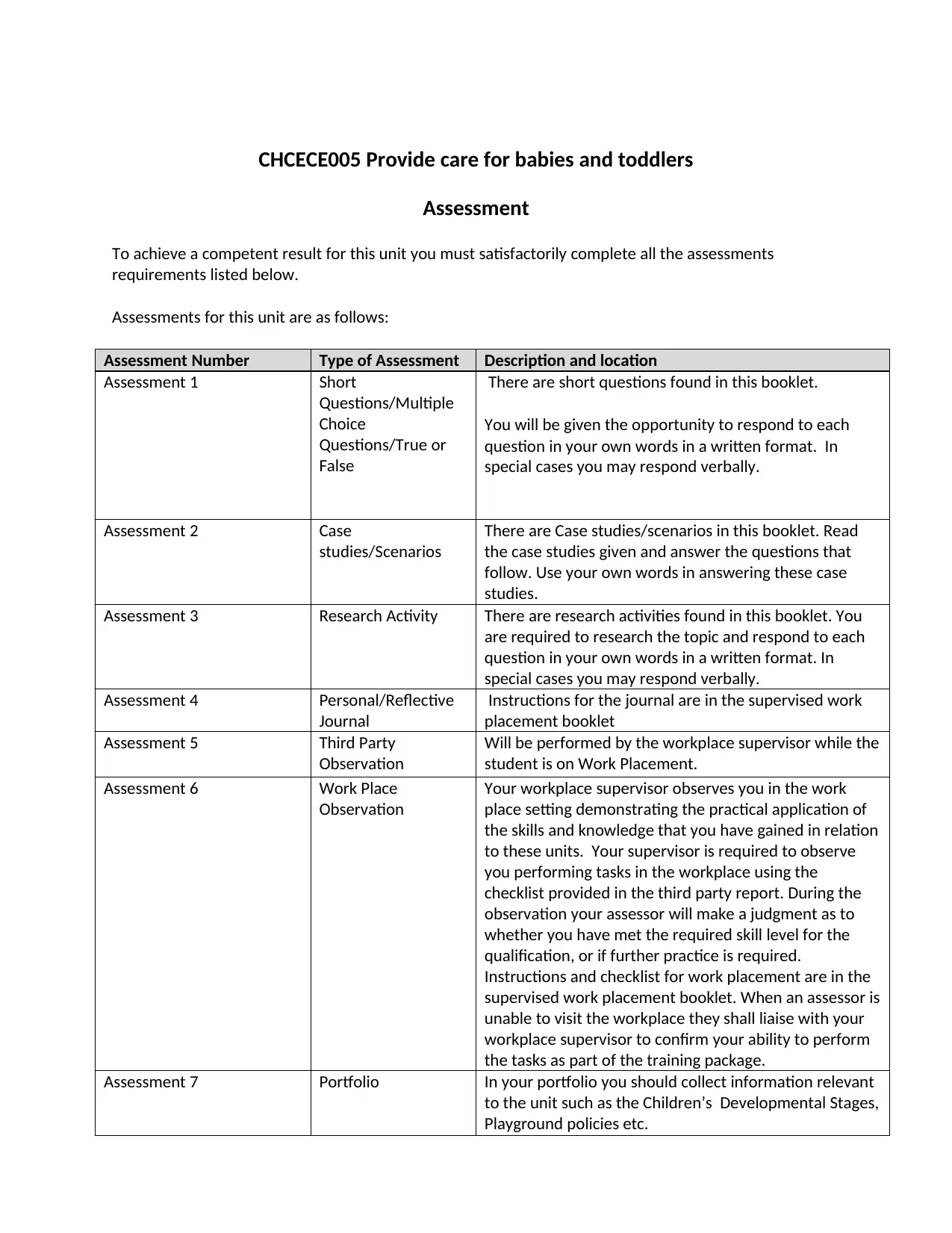
CHCECE005 Provide care for babies and toddlers
Assessment
To achieve a competent result for this unit you must satisfactorily complete all the assessments
requirements listed below.
Assessments for this unit are as follows:
Assessment Number Type of Assessment Description and location
Assessment 1 Short
Questions/Multiple
Choice
Questions/True or
False
There are short questions found in this booklet.
You will be given the opportunity to respond to each
question in your own words in a written format. In
special cases you may respond verbally.
Assessment 2 Case
studies/Scenarios
There are Case studies/scenarios in this booklet. Read
the case studies given and answer the questions that
follow. Use your own words in answering these case
studies.
Assessment 3 Research Activity There are research activities found in this booklet. You
are required to research the topic and respond to each
question in your own words in a written format. In
special cases you may respond verbally.
Assessment 4 Personal/Reflective
Journal
Instructions for the journal are in the supervised work
placement booklet
Assessment 5 Third Party
Observation
Will be performed by the workplace supervisor while the
student is on Work Placement.
Assessment 6 Work Place
Observation
Your workplace supervisor observes you in the work
place setting demonstrating the practical application of
the skills and knowledge that you have gained in relation
to these units. Your supervisor is required to observe
you performing tasks in the workplace using the
checklist provided in the third party report. During the
observation your assessor will make a judgment as to
whether you have met the required skill level for the
qualification, or if further practice is required.
Instructions and checklist for work placement are in the
supervised work placement booklet. When an assessor is
unable to visit the workplace they shall liaise with your
workplace supervisor to confirm your ability to perform
the tasks as part of the training package.
Assessment 7 Portfolio In your portfolio you should collect information relevant
to the unit such as the Children’s Developmental Stages,
Playground policies etc.
Assessment
To achieve a competent result for this unit you must satisfactorily complete all the assessments
requirements listed below.
Assessments for this unit are as follows:
Assessment Number Type of Assessment Description and location
Assessment 1 Short
Questions/Multiple
Choice
Questions/True or
False
There are short questions found in this booklet.
You will be given the opportunity to respond to each
question in your own words in a written format. In
special cases you may respond verbally.
Assessment 2 Case
studies/Scenarios
There are Case studies/scenarios in this booklet. Read
the case studies given and answer the questions that
follow. Use your own words in answering these case
studies.
Assessment 3 Research Activity There are research activities found in this booklet. You
are required to research the topic and respond to each
question in your own words in a written format. In
special cases you may respond verbally.
Assessment 4 Personal/Reflective
Journal
Instructions for the journal are in the supervised work
placement booklet
Assessment 5 Third Party
Observation
Will be performed by the workplace supervisor while the
student is on Work Placement.
Assessment 6 Work Place
Observation
Your workplace supervisor observes you in the work
place setting demonstrating the practical application of
the skills and knowledge that you have gained in relation
to these units. Your supervisor is required to observe
you performing tasks in the workplace using the
checklist provided in the third party report. During the
observation your assessor will make a judgment as to
whether you have met the required skill level for the
qualification, or if further practice is required.
Instructions and checklist for work placement are in the
supervised work placement booklet. When an assessor is
unable to visit the workplace they shall liaise with your
workplace supervisor to confirm your ability to perform
the tasks as part of the training package.
Assessment 7 Portfolio In your portfolio you should collect information relevant
to the unit such as the Children’s Developmental Stages,
Playground policies etc.
Paraphrase This Document
Need a fresh take? Get an instant paraphrase of this document with our AI Paraphraser
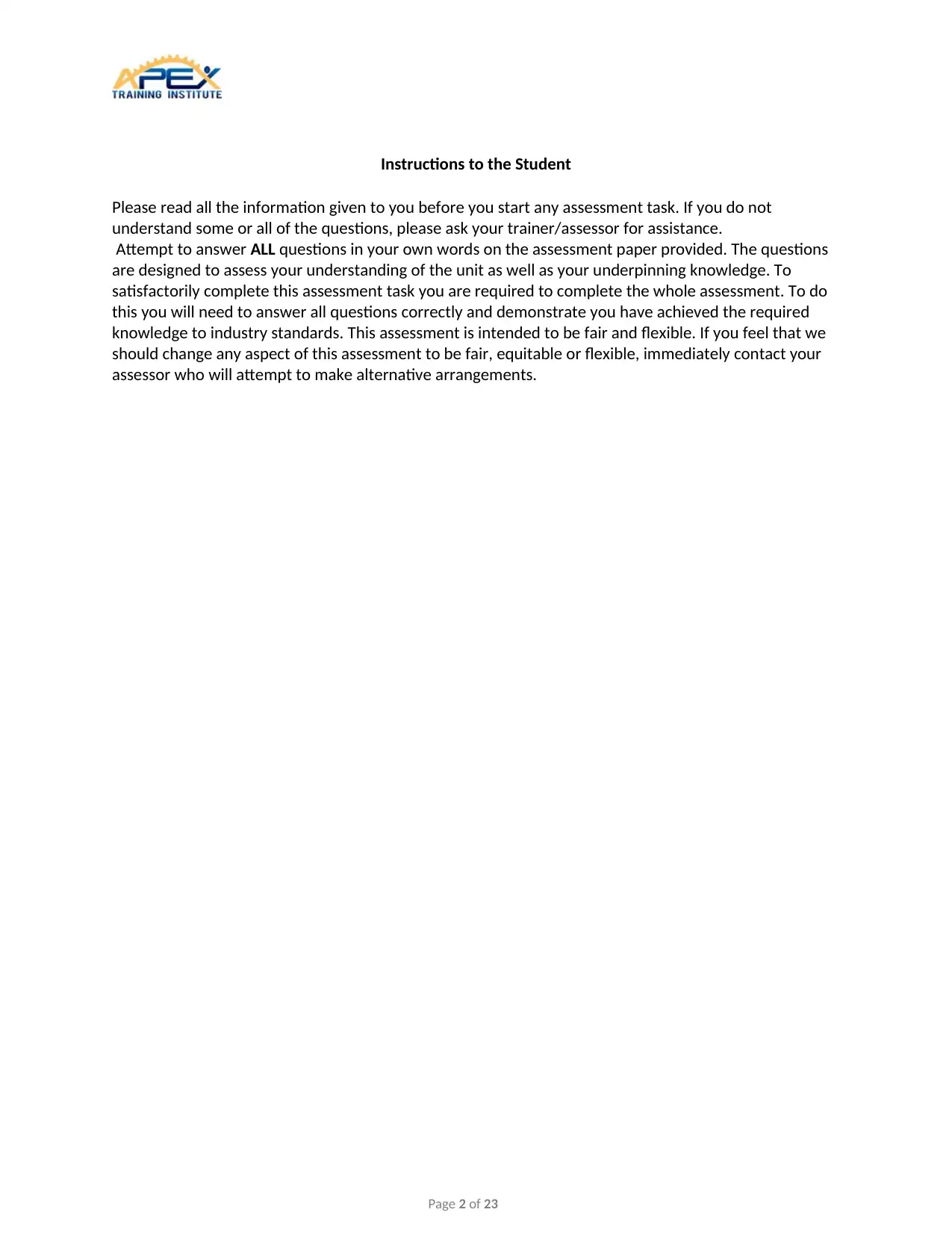
Instructions to the Student
Please read all the information given to you before you start any assessment task. If you do not
understand some or all of the questions, please ask your trainer/assessor for assistance.
Attempt to answer ALL questions in your own words on the assessment paper provided. The questions
are designed to assess your understanding of the unit as well as your underpinning knowledge. To
satisfactorily complete this assessment task you are required to complete the whole assessment. To do
this you will need to answer all questions correctly and demonstrate you have achieved the required
knowledge to industry standards. This assessment is intended to be fair and flexible. If you feel that we
should change any aspect of this assessment to be fair, equitable or flexible, immediately contact your
assessor who will attempt to make alternative arrangements.
Page 2 of 23
Please read all the information given to you before you start any assessment task. If you do not
understand some or all of the questions, please ask your trainer/assessor for assistance.
Attempt to answer ALL questions in your own words on the assessment paper provided. The questions
are designed to assess your understanding of the unit as well as your underpinning knowledge. To
satisfactorily complete this assessment task you are required to complete the whole assessment. To do
this you will need to answer all questions correctly and demonstrate you have achieved the required
knowledge to industry standards. This assessment is intended to be fair and flexible. If you feel that we
should change any aspect of this assessment to be fair, equitable or flexible, immediately contact your
assessor who will attempt to make alternative arrangements.
Page 2 of 23
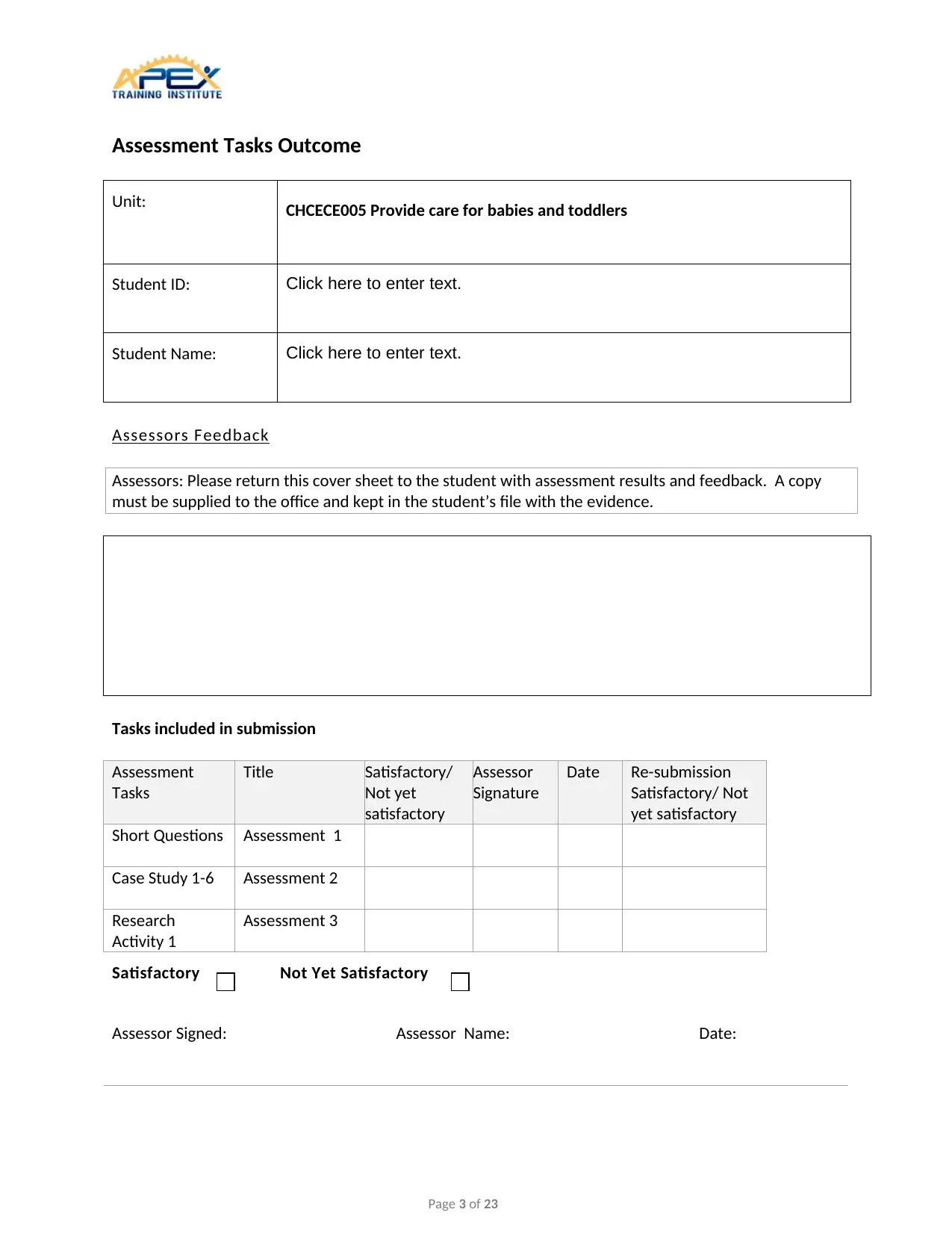
Assessment Tasks Outcome
Unit: CHCECE005 Provide care for babies and toddlers
Student ID: Click here to enter text.
Student Name: Click here to enter text.
Assessors Feedback
Assessors: Please return this cover sheet to the student with assessment results and feedback. A copy
must be supplied to the office and kept in the student’s file with the evidence.
Tasks included in submission
Assessment
Tasks
Title Satisfactory/
Not yet
satisfactory
Assessor
Signature
Date Re-submission
Satisfactory/ Not
yet satisfactory
Short Questions Assessment 1
Case Study 1-6 Assessment 2
Research
Activity 1
Assessment 3
Satisfactory Not Yet Satisfactory
Assessor Signed: Assessor Name: Date:
Page 3 of 23
Unit: CHCECE005 Provide care for babies and toddlers
Student ID: Click here to enter text.
Student Name: Click here to enter text.
Assessors Feedback
Assessors: Please return this cover sheet to the student with assessment results and feedback. A copy
must be supplied to the office and kept in the student’s file with the evidence.
Tasks included in submission
Assessment
Tasks
Title Satisfactory/
Not yet
satisfactory
Assessor
Signature
Date Re-submission
Satisfactory/ Not
yet satisfactory
Short Questions Assessment 1
Case Study 1-6 Assessment 2
Research
Activity 1
Assessment 3
Satisfactory Not Yet Satisfactory
Assessor Signed: Assessor Name: Date:
Page 3 of 23
⊘ This is a preview!⊘
Do you want full access?
Subscribe today to unlock all pages.

Trusted by 1+ million students worldwide

Page left intentionally blank
Page 4 of 23
Page 4 of 23
Paraphrase This Document
Need a fresh take? Get an instant paraphrase of this document with our AI Paraphraser
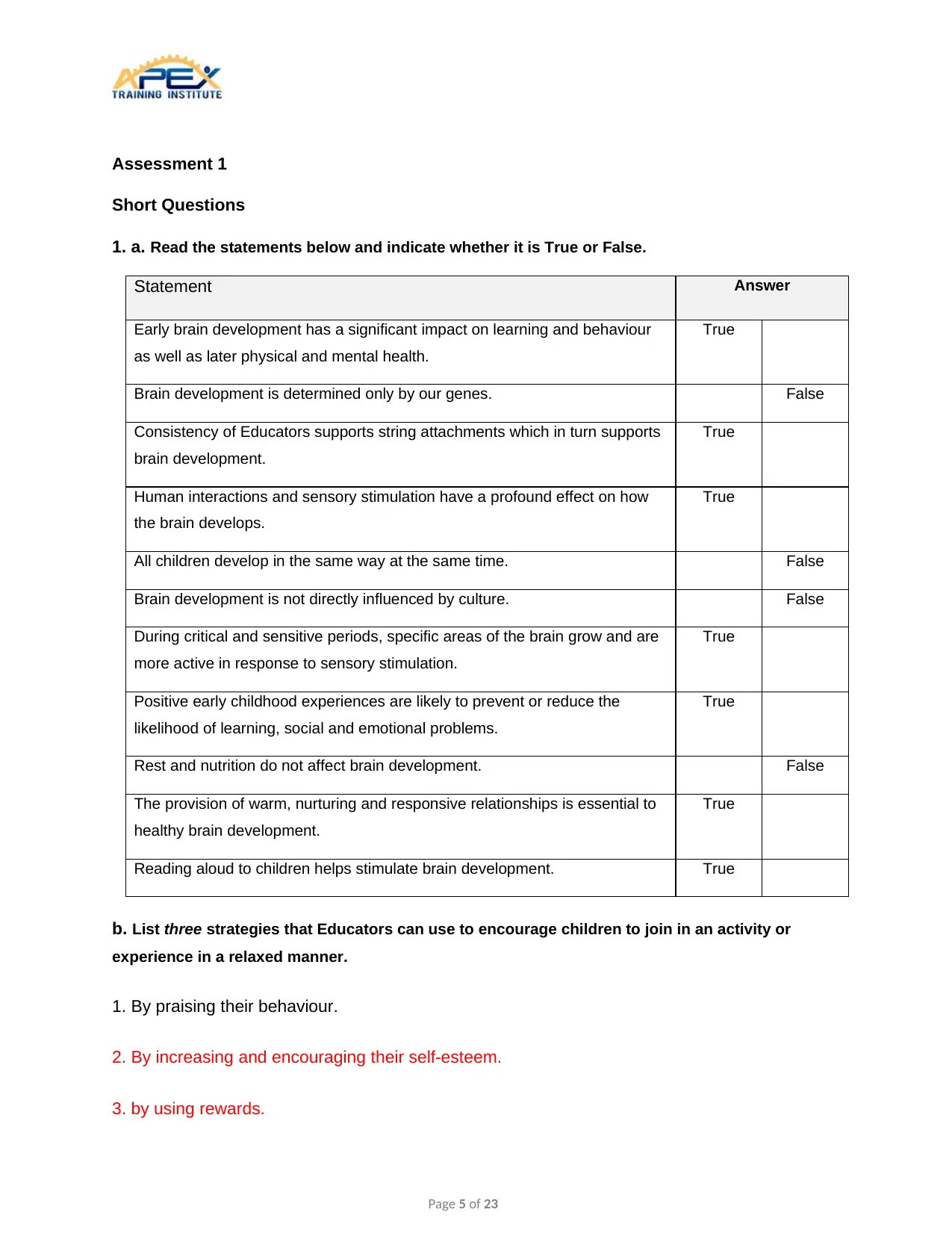
Assessment 1
Short Questions
1. a. Read the statements below and indicate whether it is True or False.
Statement Answer
Early brain development has a significant impact on learning and behaviour
as well as later physical and mental health.
True
Brain development is determined only by our genes. False
Consistency of Educators supports string attachments which in turn supports
brain development.
True
Human interactions and sensory stimulation have a profound effect on how
the brain develops.
True
All children develop in the same way at the same time. False
Brain development is not directly influenced by culture. False
During critical and sensitive periods, specific areas of the brain grow and are
more active in response to sensory stimulation.
True
Positive early childhood experiences are likely to prevent or reduce the
likelihood of learning, social and emotional problems.
True
Rest and nutrition do not affect brain development. False
The provision of warm, nurturing and responsive relationships is essential to
healthy brain development.
True
Reading aloud to children helps stimulate brain development. True
b. List three strategies that Educators can use to encourage children to join in an activity or
experience in a relaxed manner.
1. By praising their behaviour.
2. By increasing and encouraging their self-esteem.
3. by using rewards.
Page 5 of 23
Short Questions
1. a. Read the statements below and indicate whether it is True or False.
Statement Answer
Early brain development has a significant impact on learning and behaviour
as well as later physical and mental health.
True
Brain development is determined only by our genes. False
Consistency of Educators supports string attachments which in turn supports
brain development.
True
Human interactions and sensory stimulation have a profound effect on how
the brain develops.
True
All children develop in the same way at the same time. False
Brain development is not directly influenced by culture. False
During critical and sensitive periods, specific areas of the brain grow and are
more active in response to sensory stimulation.
True
Positive early childhood experiences are likely to prevent or reduce the
likelihood of learning, social and emotional problems.
True
Rest and nutrition do not affect brain development. False
The provision of warm, nurturing and responsive relationships is essential to
healthy brain development.
True
Reading aloud to children helps stimulate brain development. True
b. List three strategies that Educators can use to encourage children to join in an activity or
experience in a relaxed manner.
1. By praising their behaviour.
2. By increasing and encouraging their self-esteem.
3. by using rewards.
Page 5 of 23
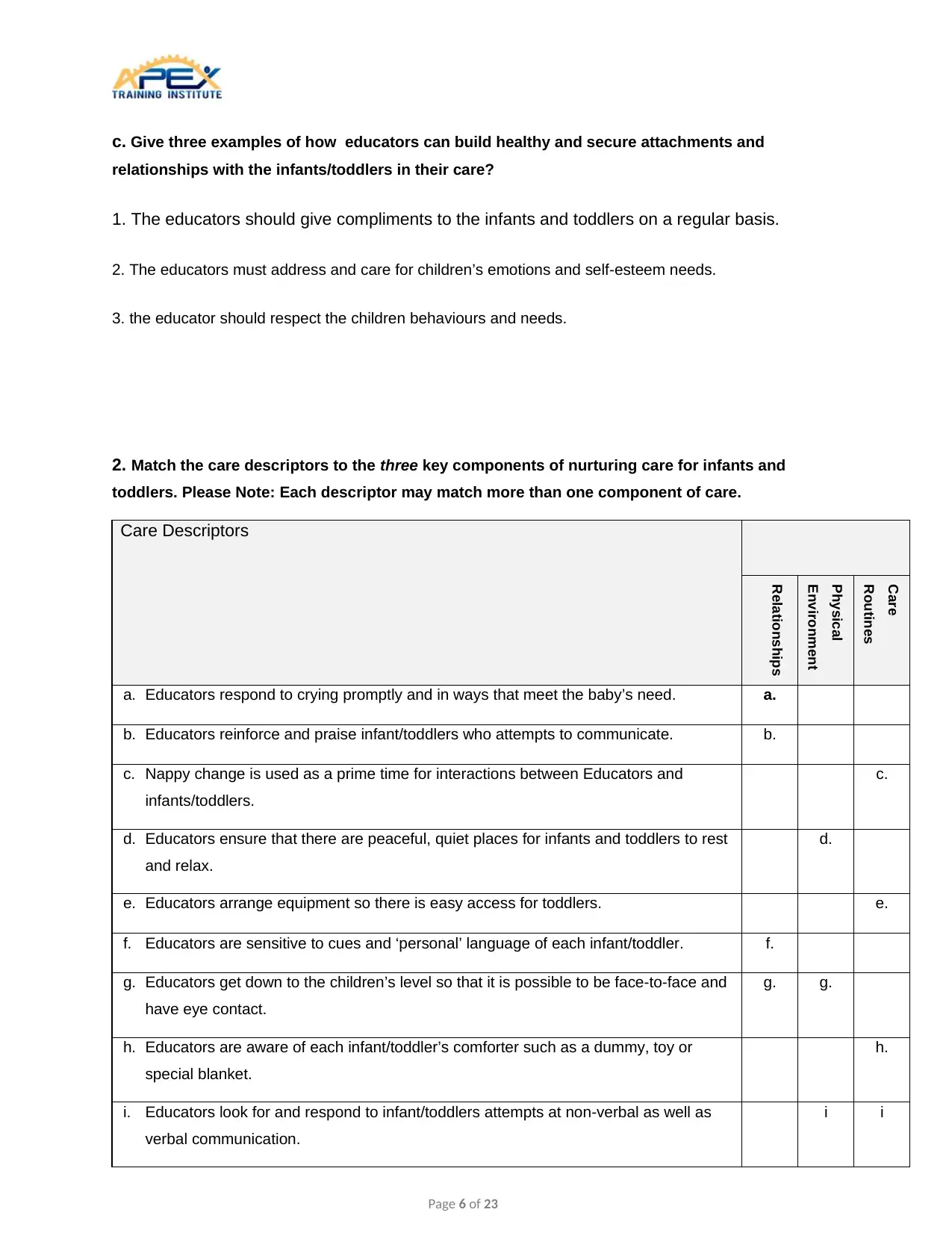
c. Give three examples of how educators can build healthy and secure attachments and
relationships with the infants/toddlers in their care?
1. The educators should give compliments to the infants and toddlers on a regular basis.
2. The educators must address and care for children’s emotions and self-esteem needs.
3. the educator should respect the children behaviours and needs.
2. Match the care descriptors to the three key components of nurturing care for infants and
toddlers. Please Note: Each descriptor may match more than one component of care.
Care Descriptors
Relationships
Physical
Environment
Care
Routines
a. Educators respond to crying promptly and in ways that meet the baby’s need. a.
b. Educators reinforce and praise infant/toddlers who attempts to communicate. b.
c. Nappy change is used as a prime time for interactions between Educators and
infants/toddlers.
c.
d. Educators ensure that there are peaceful, quiet places for infants and toddlers to rest
and relax.
d.
e. Educators arrange equipment so there is easy access for toddlers. e.
f. Educators are sensitive to cues and ‘personal’ language of each infant/toddler. f.
g. Educators get down to the children’s level so that it is possible to be face-to-face and
have eye contact.
g. g.
h. Educators are aware of each infant/toddler’s comforter such as a dummy, toy or
special blanket.
h.
i. Educators look for and respond to infant/toddlers attempts at non-verbal as well as
verbal communication.
i i
Page 6 of 23
relationships with the infants/toddlers in their care?
1. The educators should give compliments to the infants and toddlers on a regular basis.
2. The educators must address and care for children’s emotions and self-esteem needs.
3. the educator should respect the children behaviours and needs.
2. Match the care descriptors to the three key components of nurturing care for infants and
toddlers. Please Note: Each descriptor may match more than one component of care.
Care Descriptors
Relationships
Physical
Environment
Care
Routines
a. Educators respond to crying promptly and in ways that meet the baby’s need. a.
b. Educators reinforce and praise infant/toddlers who attempts to communicate. b.
c. Nappy change is used as a prime time for interactions between Educators and
infants/toddlers.
c.
d. Educators ensure that there are peaceful, quiet places for infants and toddlers to rest
and relax.
d.
e. Educators arrange equipment so there is easy access for toddlers. e.
f. Educators are sensitive to cues and ‘personal’ language of each infant/toddler. f.
g. Educators get down to the children’s level so that it is possible to be face-to-face and
have eye contact.
g. g.
h. Educators are aware of each infant/toddler’s comforter such as a dummy, toy or
special blanket.
h.
i. Educators look for and respond to infant/toddlers attempts at non-verbal as well as
verbal communication.
i i
Page 6 of 23
⊘ This is a preview!⊘
Do you want full access?
Subscribe today to unlock all pages.

Trusted by 1+ million students worldwide
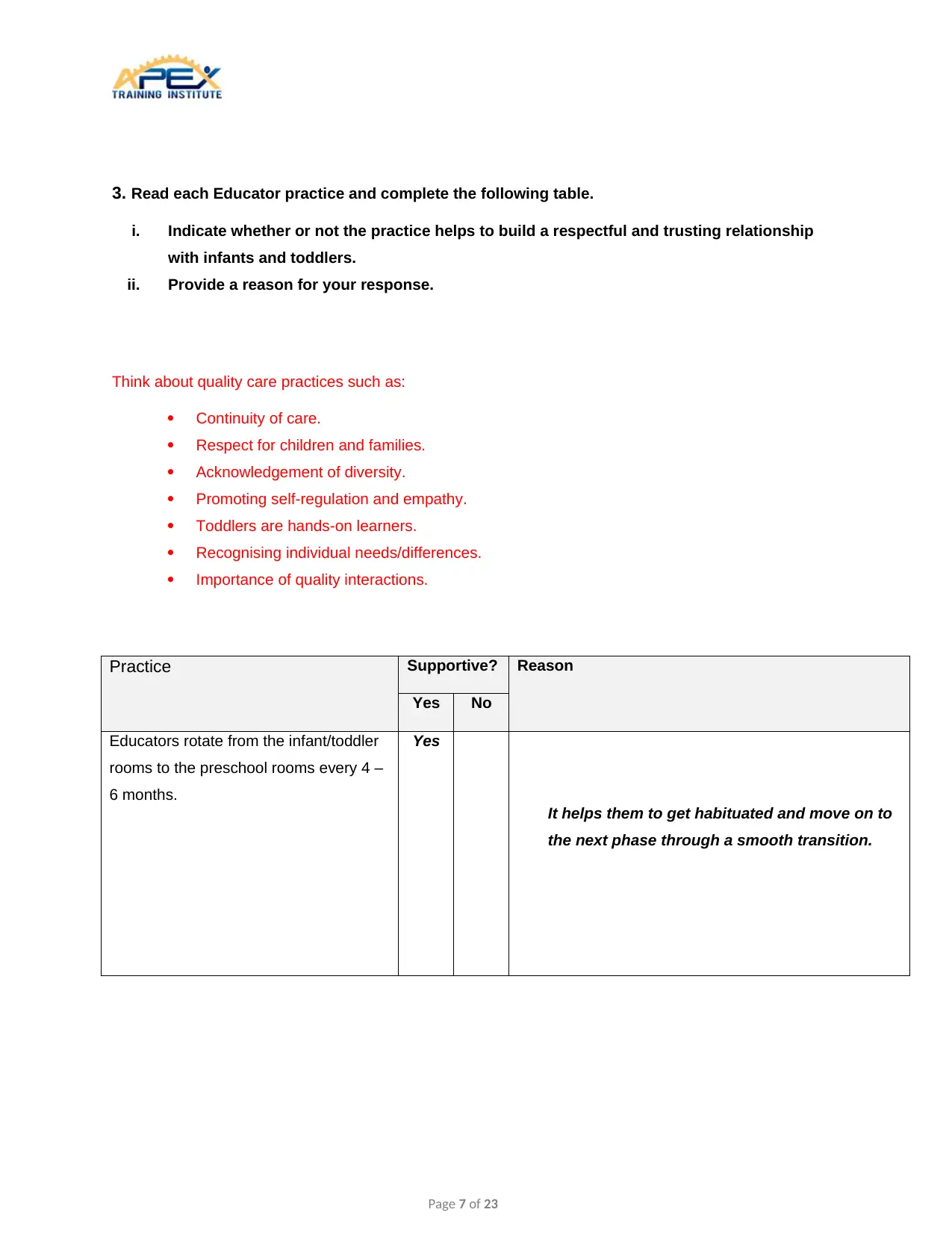
3. Read each Educator practice and complete the following table.
i. Indicate whether or not the practice helps to build a respectful and trusting relationship
with infants and toddlers.
ii. Provide a reason for your response.
Think about quality care practices such as:
Continuity of care.
Respect for children and families.
Acknowledgement of diversity.
Promoting self-regulation and empathy.
Toddlers are hands-on learners.
Recognising individual needs/differences.
Importance of quality interactions.
Practice Supportive? Reason
Yes No
Educators rotate from the infant/toddler
rooms to the preschool rooms every 4 –
6 months.
Yes
It helps them to get habituated and move on to
the next phase through a smooth transition.
Page 7 of 23
i. Indicate whether or not the practice helps to build a respectful and trusting relationship
with infants and toddlers.
ii. Provide a reason for your response.
Think about quality care practices such as:
Continuity of care.
Respect for children and families.
Acknowledgement of diversity.
Promoting self-regulation and empathy.
Toddlers are hands-on learners.
Recognising individual needs/differences.
Importance of quality interactions.
Practice Supportive? Reason
Yes No
Educators rotate from the infant/toddler
rooms to the preschool rooms every 4 –
6 months.
Yes
It helps them to get habituated and move on to
the next phase through a smooth transition.
Page 7 of 23
Paraphrase This Document
Need a fresh take? Get an instant paraphrase of this document with our AI Paraphraser
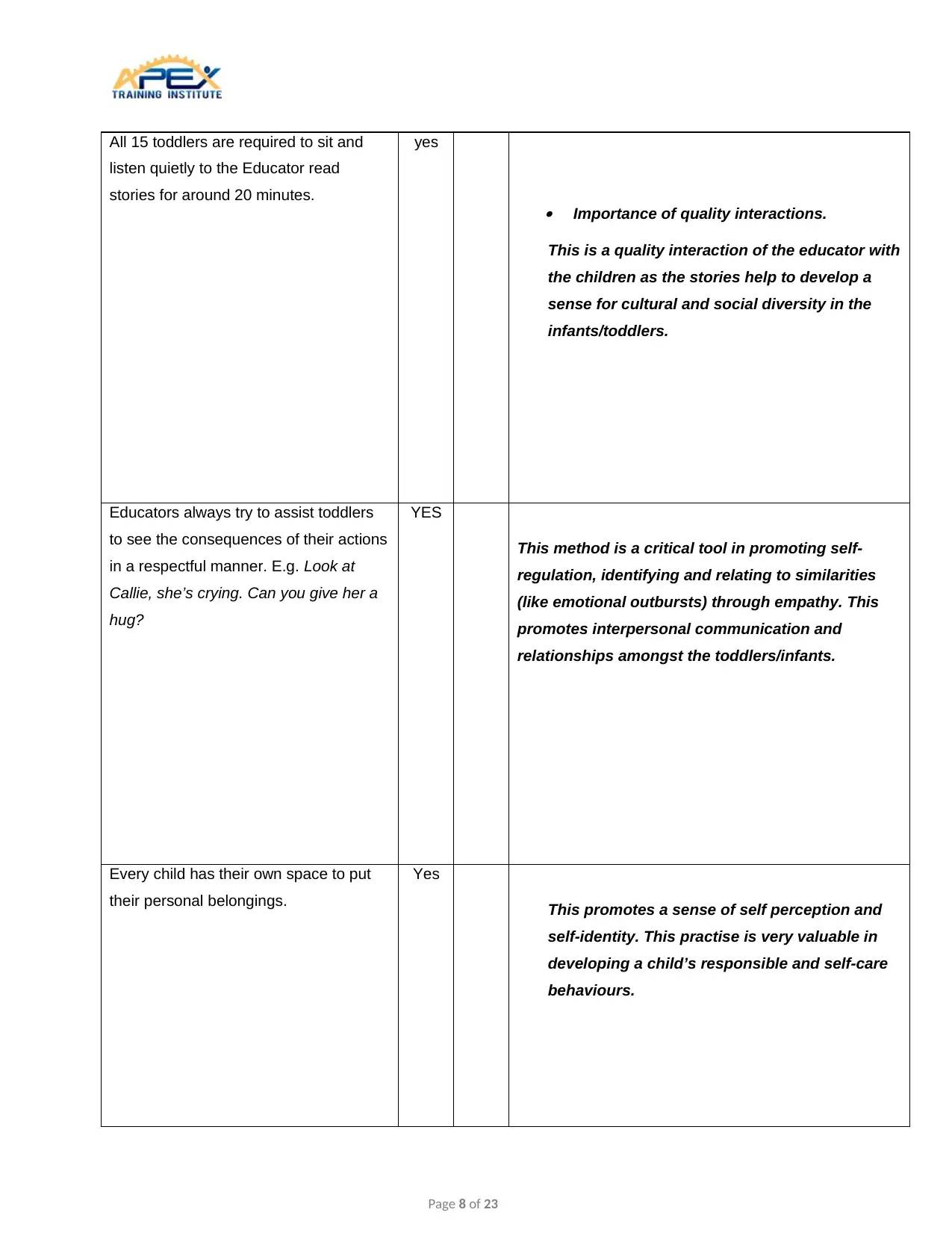
All 15 toddlers are required to sit and
listen quietly to the Educator read
stories for around 20 minutes.
yes
Importance of quality interactions.
This is a quality interaction of the educator with
the children as the stories help to develop a
sense for cultural and social diversity in the
infants/toddlers.
Educators always try to assist toddlers
to see the consequences of their actions
in a respectful manner. E.g. Look at
Callie, she’s crying. Can you give her a
hug?
YES
This method is a critical tool in promoting self-
regulation, identifying and relating to similarities
(like emotional outbursts) through empathy. This
promotes interpersonal communication and
relationships amongst the toddlers/infants.
Every child has their own space to put
their personal belongings.
Yes
This promotes a sense of self perception and
self-identity. This practise is very valuable in
developing a child’s responsible and self-care
behaviours.
Page 8 of 23
listen quietly to the Educator read
stories for around 20 minutes.
yes
Importance of quality interactions.
This is a quality interaction of the educator with
the children as the stories help to develop a
sense for cultural and social diversity in the
infants/toddlers.
Educators always try to assist toddlers
to see the consequences of their actions
in a respectful manner. E.g. Look at
Callie, she’s crying. Can you give her a
hug?
YES
This method is a critical tool in promoting self-
regulation, identifying and relating to similarities
(like emotional outbursts) through empathy. This
promotes interpersonal communication and
relationships amongst the toddlers/infants.
Every child has their own space to put
their personal belongings.
Yes
This promotes a sense of self perception and
self-identity. This practise is very valuable in
developing a child’s responsible and self-care
behaviours.
Page 8 of 23
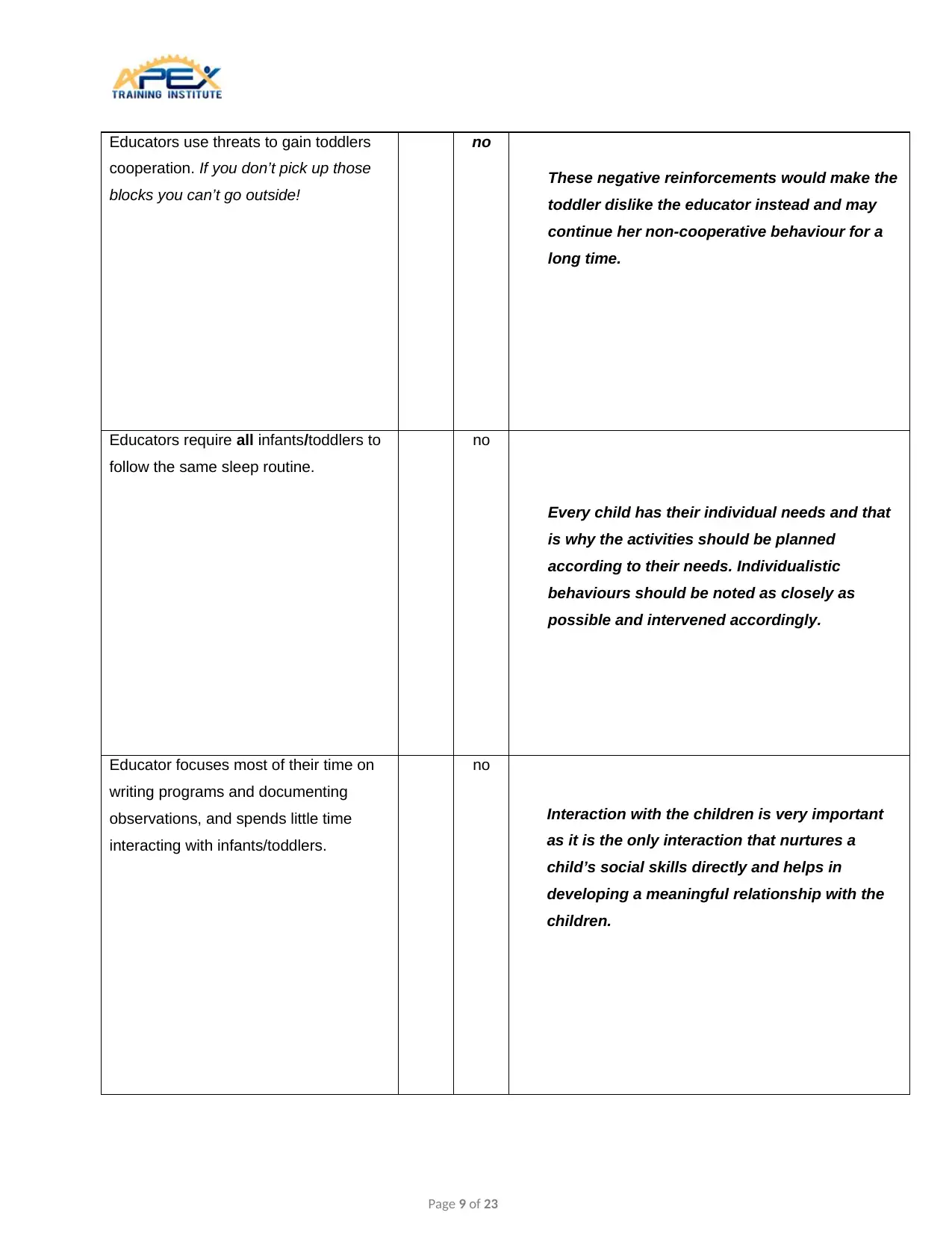
Educators use threats to gain toddlers
cooperation. If you don’t pick up those
blocks you can’t go outside!
no
These negative reinforcements would make the
toddler dislike the educator instead and may
continue her non-cooperative behaviour for a
long time.
Educators require all infants/toddlers to
follow the same sleep routine.
no
Every child has their individual needs and that
is why the activities should be planned
according to their needs. Individualistic
behaviours should be noted as closely as
possible and intervened accordingly.
Educator focuses most of their time on
writing programs and documenting
observations, and spends little time
interacting with infants/toddlers.
no
Interaction with the children is very important
as it is the only interaction that nurtures a
child’s social skills directly and helps in
developing a meaningful relationship with the
children.
Page 9 of 23
cooperation. If you don’t pick up those
blocks you can’t go outside!
no
These negative reinforcements would make the
toddler dislike the educator instead and may
continue her non-cooperative behaviour for a
long time.
Educators require all infants/toddlers to
follow the same sleep routine.
no
Every child has their individual needs and that
is why the activities should be planned
according to their needs. Individualistic
behaviours should be noted as closely as
possible and intervened accordingly.
Educator focuses most of their time on
writing programs and documenting
observations, and spends little time
interacting with infants/toddlers.
no
Interaction with the children is very important
as it is the only interaction that nurtures a
child’s social skills directly and helps in
developing a meaningful relationship with the
children.
Page 9 of 23
⊘ This is a preview!⊘
Do you want full access?
Subscribe today to unlock all pages.

Trusted by 1+ million students worldwide
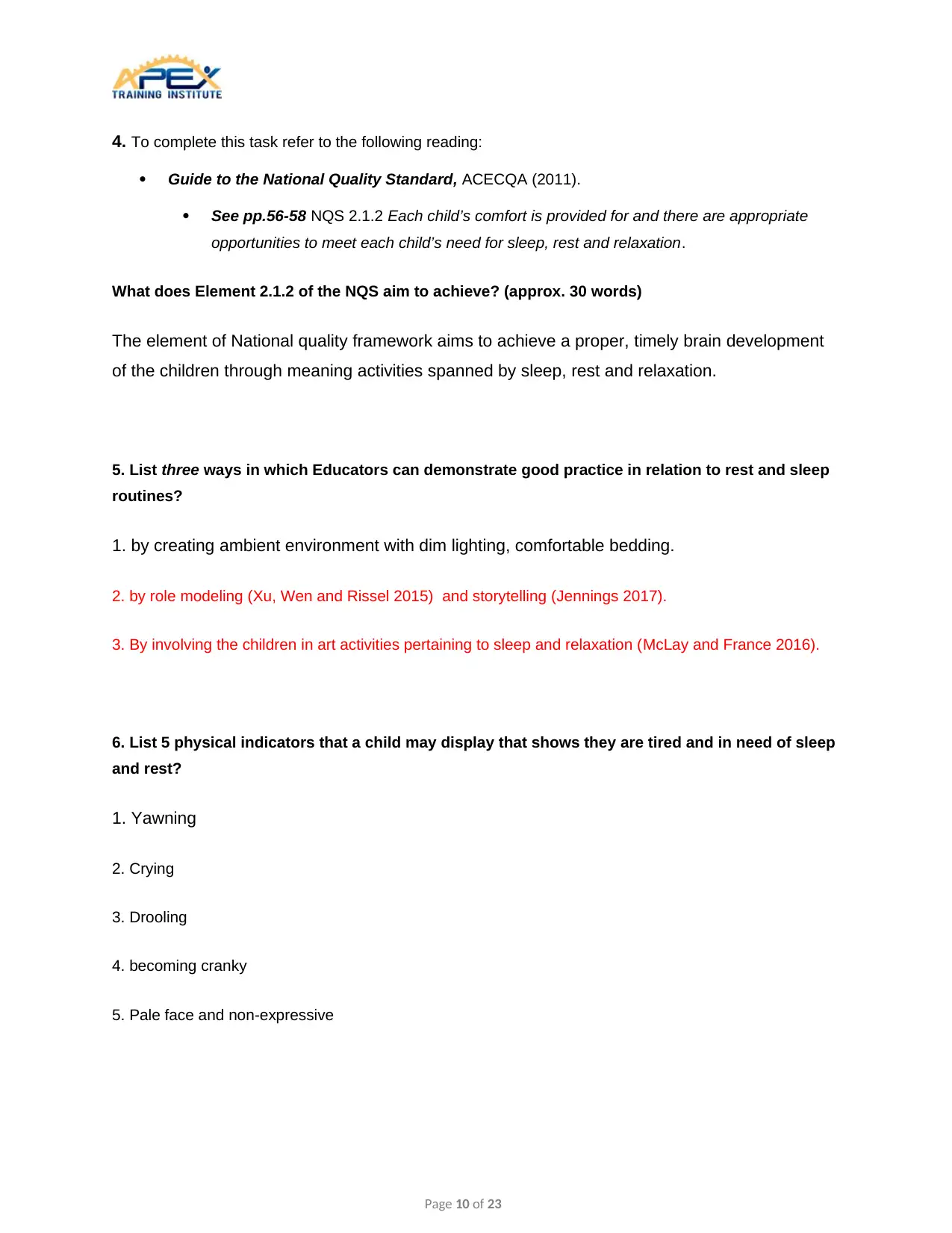
4. To complete this task refer to the following reading:
Guide to the National Quality Standard, ACECQA (2011).
See pp.56-58 NQS 2.1.2 Each child’s comfort is provided for and there are appropriate
opportunities to meet each child’s need for sleep, rest and relaxation.
What does Element 2.1.2 of the NQS aim to achieve? (approx. 30 words)
The element of National quality framework aims to achieve a proper, timely brain development
of the children through meaning activities spanned by sleep, rest and relaxation.
5. List three ways in which Educators can demonstrate good practice in relation to rest and sleep
routines?
1. by creating ambient environment with dim lighting, comfortable bedding.
2. by role modeling (Xu, Wen and Rissel 2015) and storytelling (Jennings 2017).
3. By involving the children in art activities pertaining to sleep and relaxation (McLay and France 2016).
6. List 5 physical indicators that a child may display that shows they are tired and in need of sleep
and rest?
1. Yawning
2. Crying
3. Drooling
4. becoming cranky
5. Pale face and non-expressive
Page 10 of 23
Guide to the National Quality Standard, ACECQA (2011).
See pp.56-58 NQS 2.1.2 Each child’s comfort is provided for and there are appropriate
opportunities to meet each child’s need for sleep, rest and relaxation.
What does Element 2.1.2 of the NQS aim to achieve? (approx. 30 words)
The element of National quality framework aims to achieve a proper, timely brain development
of the children through meaning activities spanned by sleep, rest and relaxation.
5. List three ways in which Educators can demonstrate good practice in relation to rest and sleep
routines?
1. by creating ambient environment with dim lighting, comfortable bedding.
2. by role modeling (Xu, Wen and Rissel 2015) and storytelling (Jennings 2017).
3. By involving the children in art activities pertaining to sleep and relaxation (McLay and France 2016).
6. List 5 physical indicators that a child may display that shows they are tired and in need of sleep
and rest?
1. Yawning
2. Crying
3. Drooling
4. becoming cranky
5. Pale face and non-expressive
Page 10 of 23
Paraphrase This Document
Need a fresh take? Get an instant paraphrase of this document with our AI Paraphraser
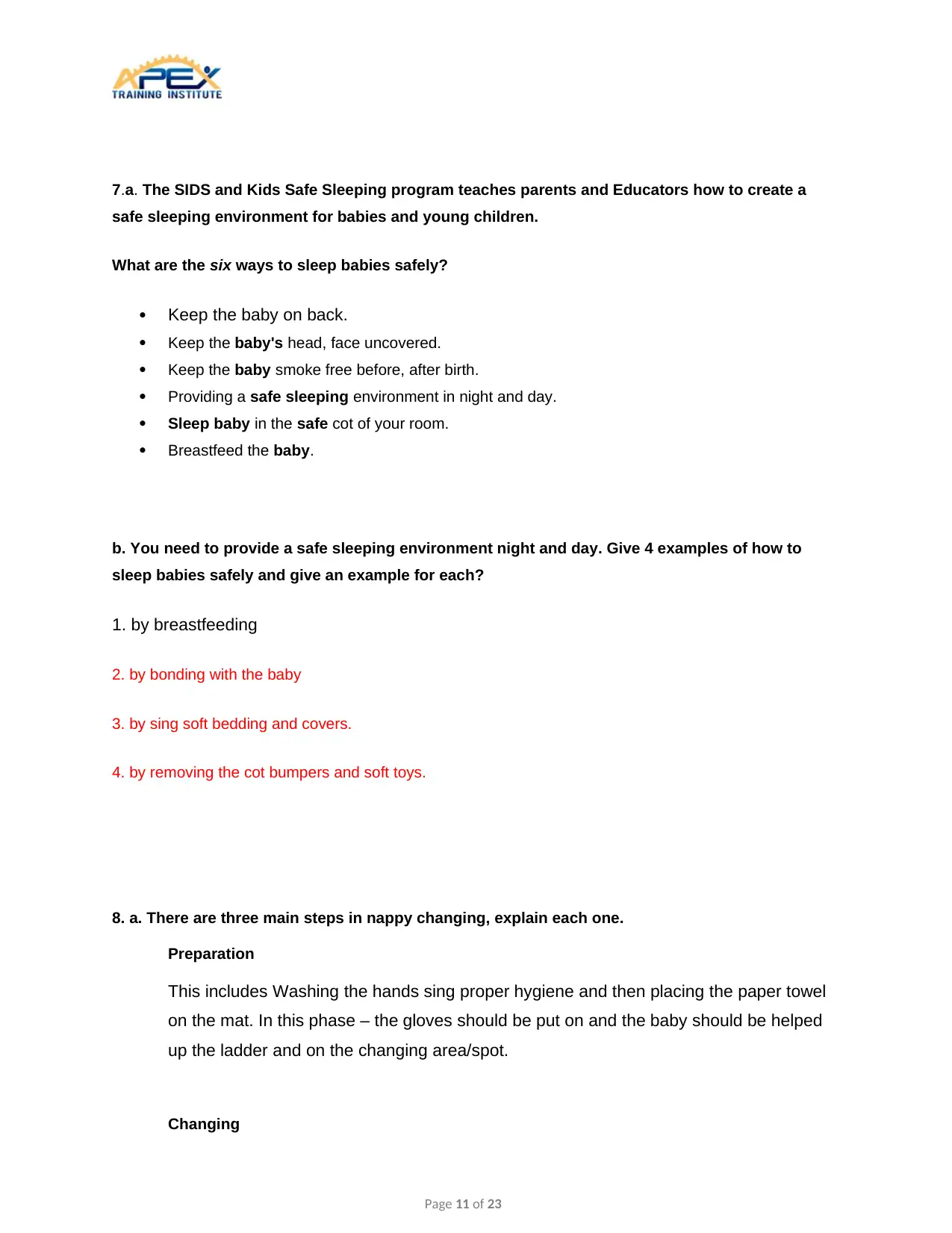
7.a. The SIDS and Kids Safe Sleeping program teaches parents and Educators how to create a
safe sleeping environment for babies and young children.
What are the six ways to sleep babies safely?
Keep the baby on back.
Keep the baby's head, face uncovered.
Keep the baby smoke free before, after birth.
Providing a safe sleeping environment in night and day.
Sleep baby in the safe cot of your room.
Breastfeed the baby.
b. You need to provide a safe sleeping environment night and day. Give 4 examples of how to
sleep babies safely and give an example for each?
1. by breastfeeding
2. by bonding with the baby
3. by sing soft bedding and covers.
4. by removing the cot bumpers and soft toys.
8. a. There are three main steps in nappy changing, explain each one.
Preparation
This includes Washing the hands sing proper hygiene and then placing the paper towel
on the mat. In this phase – the gloves should be put on and the baby should be helped
up the ladder and on the changing area/spot.
Changing
Page 11 of 23
safe sleeping environment for babies and young children.
What are the six ways to sleep babies safely?
Keep the baby on back.
Keep the baby's head, face uncovered.
Keep the baby smoke free before, after birth.
Providing a safe sleeping environment in night and day.
Sleep baby in the safe cot of your room.
Breastfeed the baby.
b. You need to provide a safe sleeping environment night and day. Give 4 examples of how to
sleep babies safely and give an example for each?
1. by breastfeeding
2. by bonding with the baby
3. by sing soft bedding and covers.
4. by removing the cot bumpers and soft toys.
8. a. There are three main steps in nappy changing, explain each one.
Preparation
This includes Washing the hands sing proper hygiene and then placing the paper towel
on the mat. In this phase – the gloves should be put on and the baby should be helped
up the ladder and on the changing area/spot.
Changing
Page 11 of 23
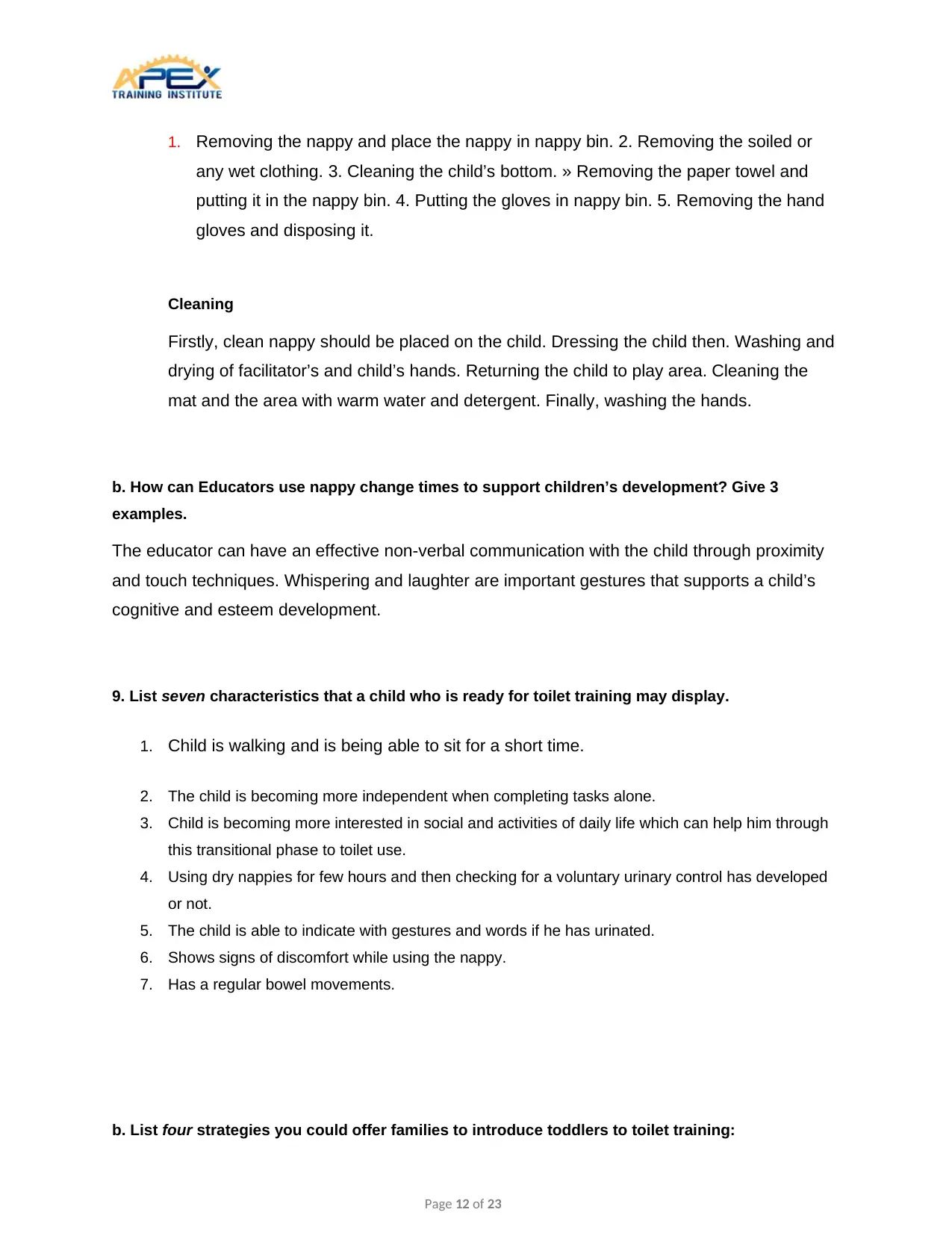
1. Removing the nappy and place the nappy in nappy bin. 2. Removing the soiled or
any wet clothing. 3. Cleaning the child’s bottom. » Removing the paper towel and
putting it in the nappy bin. 4. Putting the gloves in nappy bin. 5. Removing the hand
gloves and disposing it.
Cleaning
Firstly, clean nappy should be placed on the child. Dressing the child then. Washing and
drying of facilitator’s and child’s hands. Returning the child to play area. Cleaning the
mat and the area with warm water and detergent. Finally, washing the hands.
b. How can Educators use nappy change times to support children’s development? Give 3
examples.
The educator can have an effective non-verbal communication with the child through proximity
and touch techniques. Whispering and laughter are important gestures that supports a child’s
cognitive and esteem development.
9. List seven characteristics that a child who is ready for toilet training may display.
1. Child is walking and is being able to sit for a short time.
2. The child is becoming more independent when completing tasks alone.
3. Child is becoming more interested in social and activities of daily life which can help him through
this transitional phase to toilet use.
4. Using dry nappies for few hours and then checking for a voluntary urinary control has developed
or not.
5. The child is able to indicate with gestures and words if he has urinated.
6. Shows signs of discomfort while using the nappy.
7. Has a regular bowel movements.
b. List four strategies you could offer families to introduce toddlers to toilet training:
Page 12 of 23
any wet clothing. 3. Cleaning the child’s bottom. » Removing the paper towel and
putting it in the nappy bin. 4. Putting the gloves in nappy bin. 5. Removing the hand
gloves and disposing it.
Cleaning
Firstly, clean nappy should be placed on the child. Dressing the child then. Washing and
drying of facilitator’s and child’s hands. Returning the child to play area. Cleaning the
mat and the area with warm water and detergent. Finally, washing the hands.
b. How can Educators use nappy change times to support children’s development? Give 3
examples.
The educator can have an effective non-verbal communication with the child through proximity
and touch techniques. Whispering and laughter are important gestures that supports a child’s
cognitive and esteem development.
9. List seven characteristics that a child who is ready for toilet training may display.
1. Child is walking and is being able to sit for a short time.
2. The child is becoming more independent when completing tasks alone.
3. Child is becoming more interested in social and activities of daily life which can help him through
this transitional phase to toilet use.
4. Using dry nappies for few hours and then checking for a voluntary urinary control has developed
or not.
5. The child is able to indicate with gestures and words if he has urinated.
6. Shows signs of discomfort while using the nappy.
7. Has a regular bowel movements.
b. List four strategies you could offer families to introduce toddlers to toilet training:
Page 12 of 23
⊘ This is a preview!⊘
Do you want full access?
Subscribe today to unlock all pages.

Trusted by 1+ million students worldwide
1 out of 23
Related Documents
Your All-in-One AI-Powered Toolkit for Academic Success.
+13062052269
info@desklib.com
Available 24*7 on WhatsApp / Email
![[object Object]](/_next/static/media/star-bottom.7253800d.svg)
Unlock your academic potential
Copyright © 2020–2026 A2Z Services. All Rights Reserved. Developed and managed by ZUCOL.





